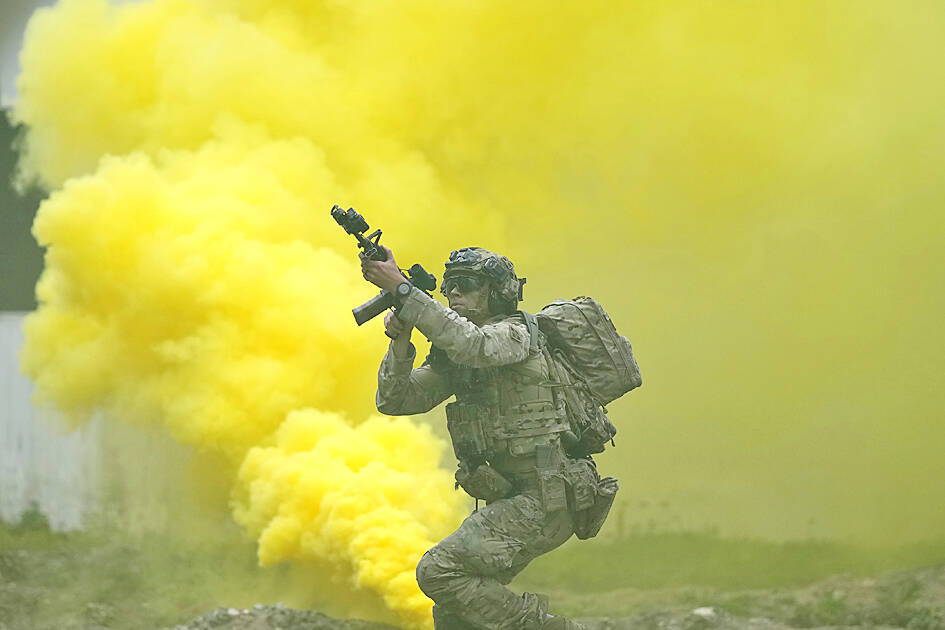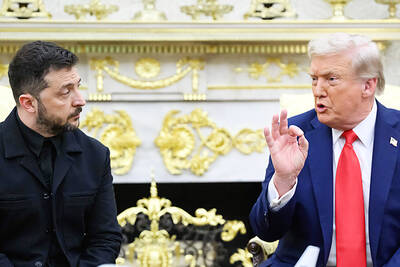South Korean and US troops this week held joint future combat drills involving drones, an uncrewed vehicle and wearable laser sensors as part of efforts to modernize their militaries, Seoul’s army said yesterday.
The training came as South Korea’s military conducts a series of annual Hoguk autumn exercises aimed at improving responses to North Korea’s nuclear and missile threats.
More than 120 soldiers from both sides joined forces to fight against a trained team of opposing forces in a mock-up town that appeared similar to the North Korean capital of Pyongyang, built at the Korea Combat Training Center in the mountains in the eastern city of Inje.

Photo: AP
The drills also mobilized high-tech weapons systems aimed at beefing up combat capabilities, with the troops wearing multiple integrated laser engagement systems (MILES), which use lasers to simulate actual battle.
Several drones were flown for reconnaissance purposes, some also firing an assault rifle, while South Korea dispatched a multipurpose uncrewed vehicle to carry wounded personnel.
Choi Jeong-il, a captain of the South Korean Army’s 25th Infantry Division, nicknamed the TIGER brigade, said the uncrewed assets and the MILES gear helped identify enemies and gauge the allied troops’ casualties.
“We were able to confirm the enemy’s movements using the drones, and hit them with the cutting-edge strike equipment, which allowed us to maximize the results of the operation while minimizing damage to our forces,” he said.
First Lieutenant Derek Chen from the Second Stryker Brigade Combat Team of the US Fourth Infantry Division said the drills offered an “eye-opening experience.”
South Korea’s army launched the TIGER brigade last year as a pilot unit for future warfare operations using artificial intelligence-powered drones and highly mobile fighting vehicles. It aims to transform all combat units based on that model by 2040.
The army also held what it called its first international future warfare competition for five days until yesterday, in which about 300 troops from five countries including the UK, Uzbekistan and Cambodia participated.

Shamans in Peru on Monday gathered for an annual New Year’s ritual where they made predictions for the year to come, including illness for US President Donald Trump and the downfall of Venezuelan President Nicolas Maduro. “The United States should prepare itself because Donald Trump will fall seriously ill,” Juan de Dios Garcia proclaimed as he gathered with other shamans on a beach in southern Lima, dressed in traditional Andean ponchos and headdresses, and sprinkling flowers on the sand. The shamans carried large posters of world leaders, over which they crossed swords and burned incense, some of which they stomped on. In this

Near the entrance to the Panama Canal, a monument to China’s contributions to the interoceanic waterway was torn down on Saturday night by order of local authorities. The move comes as US President Donald Trump has made threats in the past few months to retake control of the canal, claiming Beijing has too much influence in its operations. In a surprising move that has been criticized by leaders in Panama and China, the mayor’s office of the locality of Arraijan ordered the demolition of the monument built in 2004 to symbolize friendship between the countries. The mayor’s office said in

‘TRUMP’S LONG GAME’: Minnesota Governor Tim Walz said that while fraud was a serious issue, the US president was politicizing it to defund programs for Minnesotans US President Donald Trump’s administration on Tuesday said it was auditing immigration cases involving US citizens of Somalian origin to detect fraud that could lead to denaturalization, or revocation of citizenship, while also announcing a freeze of childcare funds to Minnesota and demanding an audit of some daycare centers. “Under US law, if an individual procures citizenship on a fraudulent basis, that is grounds for denaturalization,” US Department of Homeland Security Assistant Secretary Tricia McLaughlin said in a statement. Denaturalization cases are rare and can take years. About 11 cases were pursued per year between 1990 and 2017, the Immigrant Legal Resource

‘RADICALLY DIFFERENT’: The Kremlin said no accord would be reached if the new deal with Kyiv’s input did not remain within the limits fixed by the US and Russia in August Ukrainian President Volodymyr Zelenskiy is to meet US President Donald Trump in Florida this weekend, but Russia on Friday accused him and his EU backers of seeking to “torpedo” a US-brokered plan to stop the fighting. Today’s meeting to discuss new peace proposals comes amidst Trump’s intensified efforts to broker an agreement on Europe’s worst conflict since World War II. The latest plan is a 20-point proposal that would freeze the war on its current front line, but open the door for Ukraine to pull back troops from the east, where demilitarized buffer zones could be created, according to details revealed by